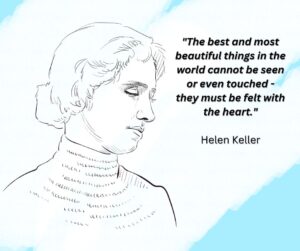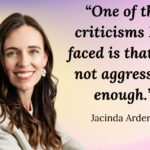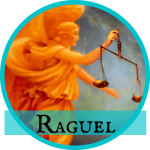Helen Keller, an extraordinary figure in history, once proclaimed, “The best and most beautiful things in the world cannot be seen or even touched – they must be felt with the heart.” This quote encapsulates a profound truth about the nature of human experience and the essence of beauty and love. Keller, who triumphed over the dual disabilities of blindness and deafness, offers a unique perspective on the intangible aspects of life that transcend physical limitations. Her words invite us to consider the intrinsic value of emotions, relationships, and experiences that lie beyond the realm of the senses.
The Life and Perspective of Helen Keller
To fully appreciate the depth of Keller's quote, it is essential to understand her background. Born in 1880, Keller lost her sight and hearing at 19 months old due to an illness. Despite these challenges, she became an author, activist, and lecturer, advocating for people with disabilities and inspiring countless individuals worldwide. Her journey from isolation to communication, facilitated by her teacher Anne Sullivan, is a testament to the power of perseverance, education, and human connection.
Keller's quote reflects her lived experience and her unique way of interacting with the world. Deprived of sight and sound, she relied heavily on touch, smell, and taste, but even more so on her intuition and emotional intelligence. Keller understood that the most profound experiences are often those that cannot be physically measured but are felt deeply within the heart.
The Intangible Essence of Beauty
Beauty, as Keller suggests, is not merely a visual or tactile phenomenon. It is an emotion, a feeling that resonates within us. This perspective challenges the conventional notion that beauty is only skin deep or limited to what we can observe with our eyes. True beauty, according to Keller, lies in the experiences and emotions that stir our hearts and souls.
Consider a sunset. Its visual splendor is undeniable, but what makes it truly beautiful is the emotion it evokes. The warmth of the colors, the tranquility of the moment, and the sense of awe it inspires cannot be captured solely by sight. Similarly, music, which Keller could not hear, carries an emotional beauty that transcends the auditory experience. It moves us, stirs our feelings, and connects us to something greater than ourselves.
Love and Connection
Keller's quote also speaks to the nature of love and human connection. Love, in its truest form, is an emotion felt deeply within the heart. It cannot be seen or touched, yet it is one of the most powerful and beautiful forces in the world. Love binds people together, fosters empathy and compassion, and gives life meaning.
Relationships, too, are built on these intangible connections. The bond between friends, the loyalty of family, and the intimacy of romantic partners are all grounded in feelings that go beyond physical interaction. Trust, understanding, and shared experiences create a depth of connection that is felt, not seen.
The Role of Intuition and Emotion
In a world that often prioritizes the tangible and measurable, Keller's words remind us of the importance of intuition and emotion. Intuition is a form of inner knowing, a sense that guides us even when we lack concrete evidence. It is the heart's way of perceiving truth and beauty. Emotions, similarly, are powerful indicators of our inner state and our connection to the world around us.
Embracing intuition and emotion can lead to a richer, more fulfilling life. It encourages us to look beyond the surface and appreciate the deeper meaning in our experiences. It allows us to connect with others on a more profound level, understanding their feelings and perspectives even when words are insufficient.
Overcoming Limitations
Helen Keller's life story is a powerful testament to overcoming limitations. Her quote reflects a mindset that transcends physical constraints and focuses on the boundless potential of the human spirit. Despite her inability to see or hear, Keller lived a life full of beauty, love, and purpose. She felt deeply, connected profoundly, and left an indelible mark on the world.
Her perspective challenges us to reconsider our own limitations and recognize that true beauty and meaning in life are not confined by our physical abilities. It is a call to cultivate inner richness, to seek out the beauty in every experience, and to value the emotional and spiritual aspects of our lives.
The Universal Application of Keller's Wisdom
Keller's wisdom is universal and timeless. In an age dominated by visual media and materialism, her words are a poignant reminder of what truly matters. They encourage us to prioritize emotional and spiritual fulfillment over superficial appearances and material possessions. They invite us to explore the depths of our hearts and find beauty in the unseen and intangible aspects of life.
Practical Applications
How can we apply Helen Keller's wisdom in our daily lives? Here are a few suggestions:
- Cultivate Mindfulness: Practice being present in the moment and attuned to your emotions. Notice the feelings that arise in different situations and honor them.
- Nurture Relationships: Focus on building deep, meaningful connections with others. Spend quality time with loved ones, listen empathetically, and express your feelings openly.
- Appreciate Intangible Beauty: Take time to appreciate the beauty in experiences, emotions, and connections. Reflect on what brings you joy, peace, and fulfillment.
- Embrace Intuition: Trust your inner sense of knowing. Pay attention to your gut feelings and let them guide your decisions.
- Find Purpose: Seek out activities and pursuits that resonate with your heart and soul. Engage in work or hobbies that bring you a sense of purpose and fulfillment.
FAQ: Understanding the Intangible Beauty Through the Heart
Q: What are some examples of the “best and most beautiful things” that cannot be seen or touched?
A: Examples include love, friendship, kindness, compassion, inner peace, joy, and the sense of fulfillment that comes from meaningful relationships and experiences. These are all felt deeply within the heart rather than perceived through the senses.
Q: How can this quote apply to our daily lives?
A: This quote encourages us to prioritize emotional and spiritual fulfillment over material possessions and superficial appearances. It reminds us to nurture our relationships, appreciate the intangible beauty in our experiences, and value our emotional well-being.
Q: How can we cultivate the ability to “feel with the heart”?
A: We can cultivate this ability by practicing mindfulness, being present in the moment, paying attention to our emotions, and nurturing deep connections with others. It also involves trusting our intuition and seeking experiences that resonate with our inner selves.
Q: How does this quote challenge conventional notions of beauty?
A: This quote challenges conventional notions of beauty by suggesting that true beauty is not about physical appearance but about the feelings and emotions that resonate within us. It redefines beauty as an inner quality rather than an external attribute.
Q: Can this quote help us overcome physical limitations?
A: Yes, this quote can inspire us to look beyond physical limitations and recognize the boundless potential of the human spirit. It encourages us to find beauty and meaning in our emotional and spiritual experiences, regardless of physical constraints.
Q: How can this quote inspire people facing challenges or disabilities?
A: This quote can inspire people facing challenges or disabilities by highlighting the importance of inner strength, emotional richness, and the ability to connect deeply with others. It reminds them that true beauty and fulfillment are found in the heart, not in physical abilities.
Q: What role do emotions play in understanding and applying this quote?
A: Emotions play a crucial role in understanding and applying this quote. They are the means through which we experience the “best and most beautiful things” in life. Embracing and honoring our emotions helps us connect with the deeper meaning of our experiences.


















